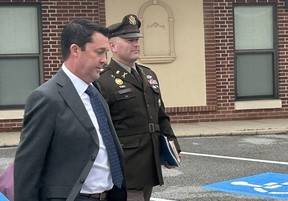Facebook group of women led to U.S. Army Ranger's rape, sex assault convictions
The jury convicted him of 20 charges involving eight women, and acquitted him of 18 counts involving seven women.

Article content
A U.S. Army Ranger who was arrested after a two-year investigation sparked by a Facebook group of women who said he sexually assaulted them was convicted Monday of two rape charges and more than a dozen other assault counts by a military jury, and will face sentencing Tuesday by a judge who could impose up to life in prison without parole.
Maj. Jonathan Batt, 40, listened to 15 women testify against him during his three-week trial at Fort Meade in Maryland, then took the witness stand and provided detailed explanations for why, in his view, all the sexual encounters were consensual. “I am not a rapist,” Batt told the jury of three colonels and five lieutenant colonels, who heard closing arguments June 16, then deliberated for three days in the week since.
The jury of six men and two women convicted Batt of 20 charges involving eight women, and acquitted him of 18 counts involving seven women. Each rape charge carries a maximum sentence of life without parole, and each sexual assault count has a 30-year maximum term.
The jury foreman declined to comment after the verdict. Batt chose to have military Judge Adam S. Kazin sentence him rather than the jury. The judge will hear testimony Tuesday morning before imposing sentence.
“There’s a mix of emotions,” said Ryan Guilds, a lawyer representing nine of the women who testified. “Disappointment for those who didn’t get the justice they deserved, validation for many of them, that they were believed. … Though today was a good day, it doesn’t change the incredible amount of harm suffered by these victims.”
The total number of charges Batt faced was steadily reduced after he was initially arrested last October on 77 counts, including 14 rape and 16 aggravated assault charges. Prosecutors from the Army’s Office of Special Trial Counsel said five of the initial 20 accusers withdrew from the case, and a number of other charges were dismissed or combined with other counts. In the end, the jury considered six rape charges, two aggravated assault by strangulation charges, 10 sexual assault and 16 assault and battery charges among 38 total counts.
Batt, a West Point graduate who then entered Ranger School, rose to major and was in line for a promotion to lieutenant colonel before his arrest. He had been assigned to an artificial intelligence division of the Army in Arlington, Virginia, where he also lived. He kept a boat on the Potomac, the “Batt Boat,” on which some of the incidents originated. He has a young daughter and testified he got married last month.
Prosecutors said Batt met the women through online dating apps, through friends or through work. All of the women agreed to dates, but many said they did not agree to sex, particularly on the first date.

From 2020 to 2023, “Major Batt preyed upon and attacked 15 different women when they were vulnerable, isolated and defenseless,” Army Lt. Col. Gregory A. Vetere said in his closing argument. He cited the testimony of a woman who had fended off one physical advance by Batt, told him she wasn’t interested in sex, then in a later encounter was forced to have sex at night on the Potomac River while they were on a Jet Ski.
Prosecutors also said Batt strangled three women into unconsciousness during sex, without their consent. “They felt the life force being driven out of them,” Vetere said. “It is clear that the accused, in their testimony, was having sex with their unconscious bodies. That is rape, for which consent is not even a defense. An unconscious person cannot consent.”
Other women said they were tied with ropes against their will or forced to have sex after they said no. Two lawyers and an Army soldier were among the 15 women who testified against Batt.
Some of the women met after one of Batt’s girlfriends posted on the Facebook group, “Are We Dating the Same Guy?” Batt’s lawyer, Nathan Freeburg, said the subsequent discussions among the women constituted “witness contamination,” in which witnesses are exposed to prejudicial information before they testify.
Freeburg noted in his closing argument that Batt testified for nearly an entire day. “He looked you in the eye and told you the truth. We’ve done all an innocent person can do. We’ve shouted from the rooftops, he is innocent.”
Freeburg pointed out that many of the women had subsequent encounters with Batt after claiming he sexually assaulted them. “I always have fun with you guys,” one woman texted Batt after engaging in a video-recorded threesome, Freeburg reminded the jury. The video itself was shown to the jury, though prosecutors claimed it was edited by Batt to remove the criminal element of the encounter.
Another woman sent more than 100 messages to Batt after she was allegedly attacked. “That’s not someone who got assaulted,” Freeburg told the jury. “None of this makes sense.”
Batt maintained that nearly all of his actions were consensual and not unusual. “There’s always a conversation about what the other party wants,” he told the jury.
Prosecutors summoned an expert on how victims of violence respond to their attackers. She testified that many victims of interpersonal violence often maintain ties with their assailants. The jury was given instructions on multiple counts that evidence of sexual interactions with Batt “should be considered as to whether she [the accuser] consented to the charged act.”
The women in Batt’s trial gave varying explanations of why they continued to see Batt after he allegedly assaulted them. One of them, a lawyer, said she was shocked when Batt had sex with her after she specifically told him no, a warning Batt admitted to on the stand, and more shocked when he placed his hands around her neck, nearly rendering her unconscious.
But she said she discussed the choking with him, and returned for a second encounter. She testified that the strangling lasted longer the second time, but still she returned for a third time, with no strangling, before ending the relationship.
“Just trying to give him the benefit of the doubt,” the woman testified. “He seemed like a nice guy.” The jury acquitted Batt of sexual assault but convicted him of aggravated assault by strangulation in the counts related to the woman.
The woman who first contacted police, in the summer of 2021, told a story even Freeburg acknowledged was “horrific,” of being partially bound, strangled and raped after recently undergoing surgery as part of her transgender conversion. She said she had not told Batt that she was transgender.
But after undergoing a sexual assault exam at Inova Fairfax Medical Campus, meeting with a detective and starting therapy, she told police she didn’t want to prosecute Batt. She then saw him a second time and agreed to be bound again. She said she met with him to hear him apologize in person for their first encounter.
A year later, when the woman saw the Facebook group, she returned to the Alexandria police and said she wanted to prosecute. She had spoken to others who had posted in the group, some of whom then also cooperated with police and testified at the trial. The investigation restarted in August 2022 and was later joined by the Army Criminal Investigation Division, culminating in Batt’s arrest.
Batt was convicted of rape and assault and battery for his first interaction with the woman, and also rape of a second woman. The jury acquitted Batt of four rape counts involving other women but convicted him of a lesser charge of assault in each case.
Though Freeburg claimed that the women’s interactions before trial constituted contamination, prosecutor Capt. Stephanie Ryder said eight of the 15 women who testified had never seen the Facebook group.
Ryder said three of the women testified that Batt had strangled them into unconsciousness. Six women were bitten, struck or slapped by Batt, Ryder said.
“These women have done everything they can to stand up for themselves,” Ryder told the jury. “Major Batt is a sadist and he is sexually obsessed. He took whatever he wanted whenever he wanted.”
“Navigating the criminal justice system can be extremely daunting,” said Adrian R. Perry, director of victim services for Attorney General Jason Miyares (R) of Virginia, where many of the victims reside, “and not having victim advocacy support often amplifies the fears and anxieties victims experience after reporting what happened to them.”











Postmedia is committed to maintaining a lively but civil forum for discussion. Please keep comments relevant and respectful. Comments may take up to an hour to appear on the site. You will receive an email if there is a reply to your comment, an update to a thread you follow or if a user you follow comments. Visit our Community Guidelines for more information.